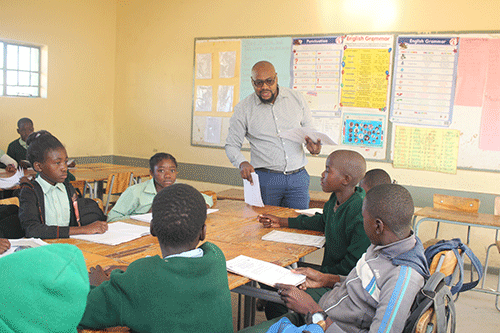ONGWEDIVA – The high failure rate of candidates who sat for the 2022 national examinations has once again stirred the nation, with many fingers pointing to the reformed curriculum that was implemented in 2021.
The new curriculum has reignited conversations around the topic, with many saying teachers and learners were not well-equipped with adequate knowledge of the curriculum, while others say it is not realistic to the Namibian education system.
About 80% of the candidates who sat for the Namibia Senior Secondary Certificate Ordinary (NSSCO) and the Advanced Subsidiary (AS) levels failed to qualify for admission to tertiary institutions.
Only 21% of learners qualified for AS level in 2023, similar to last year’s results, as about 80% of the grade 11s did not meet the requirements to advance to AS level.
“We didn’t get enough time to study as school started so late last year due to the remarking of the national examinations. That also means we didn’t get to finish the syllabi,” said Josephine Ndashaala, who matriculated at the Negumbo Secondary School in the Omusati region.
Although she has qualified for tertiary education, she is not pleased with her results as she could have performed better.
“The AS level has been performing poorly because we didn’t really understand what we were being taught. We noticed that sometimes the teachers were also struggling with certain topics. So, when that happened, they would send us to the computer laboratory to go and do further research on those topics,” she noted.
Similar sentiments were echoed by Ester Kalimbo, who matriculated at the Pace Private School in the Oshana region.
“I believe teachers did the best they could. However, some topics or syllabi were so challenging that we would end up skipping them, or not fully understanding them. We are also not entirely blaming the new curriculum, as we also could have done our part. But they (educators) should have prepared us enough to ensure that we are capacitated with the necessary knowledge,” she stressed.
Kalimbo, who was in grade 11, plans on improving her results this year.
In a statement issued this week, the Popular Democratic Movement (PDM) repeated the submissions it made to Cabinet in 2020 regarding the new curriculum.
“We have always said that if learners were unable to achieve as they would have wished when writing exams after two years of trying to master the required work, on what possible grounds did the ministry expect that they will be able to master this same amount of work when they were a whole year younger and therefore less mature from the previous year when following the so-called new curriculum?” read the statement from their member of parliament, Inna Hengari.
She added: “When the results for 2021 were announced, we were informed that teachers had not prepared grade 12 learners adequately. For this past exam, one wonders whether teachers were prepared adequately to not only understand the new curriculum and its contents, but also in transferring that knowledge through teaching.”
Flawed
According to opinions shared by various teachers on a Facebook platform for Namibian teachers called Classical Teachers of Namibia, some believe the poor performances were aggravated by the vacant heads of department (HOD) posts, a lack of adequate teaching materials, learners’ ill-discipline as well as the absence of teachers during lessons.
“Education is in a crisis. Blaming teachers only will not solve the problem. The system of promoting failing kids to the next grades, the lowering of passing requirements, solidarity appointments of non-performing teachers in promotional and senior positions, serious lack of parental involvement, tied with non-committed teachers, and the ineffective implementation of free education as propagated is the best mix for such disappointing and shameful results,” a teacher lamented on the platform.
Another teacher said “some learners do not do their homework, come to school drunk, and with the new curriculum and its challenges, some learners are enrolled in grade 8, not knowing how to read at all.”
In an interview with New Era, the secretary general of the Trade Union Congress of Namibia (Tucna) Mahongora Kavihuha said the implementation of the curriculum is flawed.
He said the AS level was not properly reviewed, and that the education curriculum has now changed for the worse.
“The issue of the grade 11 exit point must be removed as the pupils are not mature enough to go to universities. There is also no policy for the training of teachers, and there is no budget for it. Teachers also don’t have hope in the education system under the current leadership because their grievances are not heard. There is no culture of social dialogue. The crucial implementers of strategies are the teachers ,and if they are not motivated, who is going to implement those strategies?” he questioned. He then requested President Hage Geingob to ask for reports not only from the ministry, but all education stakeholders.
Regroup, refocus
The education ministry’s executive director Sanet Steenkamp said although various factors equally contributed to the high failure rate, many have blamed it on the reformed curriculum.
“However, we must understand that the curriculum is the Namibian qualification benchmarked against Cambridge International and accredited, and we cannot lower our quality. So, what we need to do is work extremely hard in securing the funds so that we can support the capacity development of the practical content of the subjects to bring in a system where teachers will not be fearful or filled with pride to admit that they require assistance so that we can work together in mastering scientific topics in the syllabi,” she observed.
Steenkamp added that the ministry is in the process of assessing specific root causes, and seeing how the cohort of learners was affected.
“So, not all is lost. We are optimistic that we will find solutions and of course, the transformation of education takes time,” she stated.
– ashikololo@nepc.com.na


